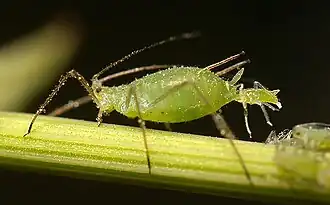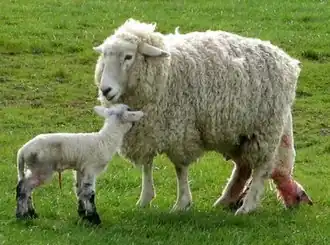< Korean < Words


Korean/Words/낳다
| |
낳다

Female aphid giving birth

Lambing (The second of twins being born)
- 배 속의 아이, 새끼, 알을 몸 밖으로 내놓다. [3]
- to bear, or give birth to (a baby or youngling);
- to lay (an egg).
- Objects
- 아이 (ai, "baby") cf. Dutch ei, German Ei "egg"
- 알 (al, "egg") cf. Dutch ei, German Ei "egg"
- 새끼 (saekki, "youngling") [4]
- Relatives
- 나이 (nai, "age")
- 태어나다 (taeeo-nada "to be born") cf. nation
- 나타나다 (natana-da, vi. "to come out") cf. nature
- 나타내다 (natanae-da, vt. "to show, display")
- 나오다 (natana-da, vi. "to come out")
- 내놓다 (naenoh-da, "to put out")
- 놓다 (neoh-da, "to put on")
- 넣다 (neoh-da, "to put in")
- Comparatives
|
- ↑ https://ko.dict.naver.com/#/search?query=낳다
- ↑ https://en.wiktionary.org/wiki/낳다
- ↑ This vital concept is not well (concisely and precisely) worded in English, at least.
- ↑ For example, calf, colt, lamb, kitty, puppy, etc.
- ↑ donner naissance (vt.) "to give birth or rise to"
- ↑ nascere (vt.) "to give birth to"
This article is issued from Wikiversity. The text is licensed under Creative Commons - Attribution - Sharealike. Additional terms may apply for the media files.
.jpg)